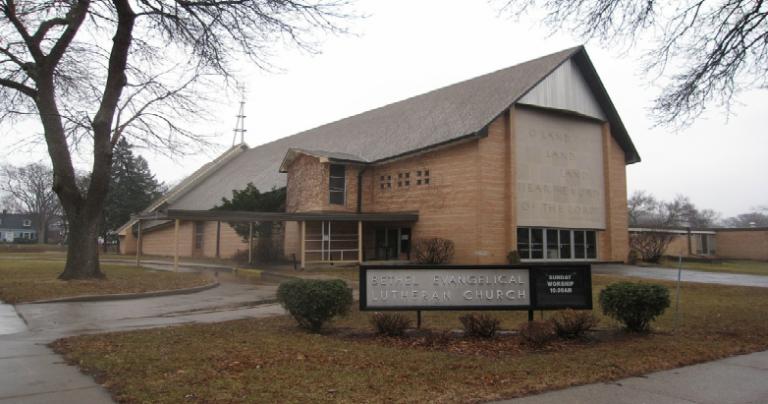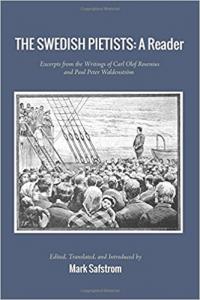What does it mean to be an evangelical? It’s a hard question to answer even if we confine it to the realm of academic inquiry, where historians, sociologists, theologians, and others dispute how to categorize Christian experience and thought. But it’s all the more vexing when the word is regularly used by pollsters and pundits, politicians and pastors — few of whom know the Bebbington Quadrilateral, or its shortcomings. I sometimes wish we could all agree to add the e-word to the long list of terms that have passed out of regular usage in the English language.
But here’s (part of the) problem: Many Christians want to be described as evangelical. And not just those who read this Patheos channel.
“Its meaning,” wrote Herbert Chilstrom of “evangelical” in March 2012, “is almost disarming in its simplicity. It describes one who believes the Good News about Jesus Christ. It centers in his death and resurrection that we will soon observe as the high points of our Christian year. We believe that at its heart the Bible is primarily about this unbelievable, incredible message of hope.” If that‘s what it means, who wouldn’t want to be an evangelical?
Which is precisely why Chilstrom argued strongly for including that word in the title of the new denomination for which he was the first presiding bishop: the Evangelical Lutheran Church in America. Though only one of the three Lutheran bodies that merged in 1987 had “evangelical” in its title, Chilstrom wanted the ELCA to put the e-word first in its name, in order
to make it known that anyone who embraces that fundamental focus on Jesus Christ is welcome to be a member of one of our congregations: old, young, Democrat, Republican, Independent, African American, Caucasian, Hispanic, straight, gay, single, married — yes, anyone. We are different; yet held together in Jesus Christ. What identifies us is not our position on a political issue or our stance on a complex moral question where we have inevitable differences of opinion. No, being “evangelical” is simply to trust completely in Jesus Christ.
But of course, almost no one asking the question that started this post actually thinks about the ELCA when they formulate their answer. And that is suggestive of the “identity problem” that ELCA minister Robert Blezard analyzes in the current issue of his denominational magazine. Describing what the media calls “evangelicals” as “a formidable political movement as much as a religious one,” he quotes Chilstrom:
The title sort of got kidnapped by those who now call themselves evangelicals… I have always called them the “so-called evangelicals”… What holds them together seems to be their position on moral issues like abortion, gun control and what have you. What holds us together is the core value that we are people of the gospel.
So did politically conservative evangelicals “kidnap” the word from its rightful owners?

In a sense, Chilstrom is absolutely right. Even many of those participating in last week’s “evangelical consultation” at Wheaton College — the “evangelical Harvard” — fear that their cherished word has been taken over by a particularly noxious political movement. “When people say what does it mean to be an evangelical,” complained convener Doug Birdsall of the Lausanne Movement, “people don’t say evangelism or the gospel. There’s a grotesque caricature of what it means to be an evangelical.” What Fuller Seminary president Mark Labberton calls the “crisis of evangelicalism” has been “caused by the way a toxic evangelicalism has engaged with these issues in such a way as to turn the gospel into Good News that is fake.”
And yet… even if Birdsall and Labberton could somehow bring evangelicals back to the Evangel in such a way that they renounce the culture warring of the Religious Right, wouldn’t Chilstrom still feel like his term had been kidnapped? Wouldn’t any leader of an avowedly “Evangelical” mainline church want to contest the notion that other Protestants — but not him — have a high view of Scripture, recognize the centrality of the Cross, seek conversion, and practice evangelism and social action?
The truth is, to call oneself “evangelical” has always been to kidnap or hijack a term from other Christians.
After all, those who followed Martin Luther out of the late medieval church called themselves “evangelicals” before they called themselves “Protestants” or “Lutherans.” The writers and artists flooding early 1520s Germany with pro-Luther pamphlets and woodcuts described themselves as “evangelical,” explains Carlos Eire, because their “anti-Romish” work “contrasted the ‘unnecessary’ burdens of the pope’s church with the liberating power of the gospel…”
I’d need a medievalist like Beth to speak more authoritatively to this, but wouldn’t medieval Christians have thought of their church as being evangelical, as well as apostolic and catholic? Wouldn’t those who continued to follow the bishop of Rome have seen themselves as people “of the Gospel”?
But Chilstrom’s spiritual forebears ultimately seized the term not only from their “Romish” antagonists, but from other Protestants. “The newly self-identified Lutherans,” writes Diarmaid MacCulloch of late 16th century Germany, “took over the once-general Protestant label ‘Evangelical’ to describe their Churches, just as the non-Lutherans were monopolizing the name ‘Reformed.’”
It was such Lutheran churches that Philipp Spener hoped to reform in 1675, when he lamented the spiritual deadness of “our Evangelical church, which according to its outward confession embraces the precious and pure gospel, brought clearly to light once again during the previous century through that blessed instrument of God, Dr. Luther, and in which alone we must therefore recognize that the true church is visible…”
 Spener never stopped thinking of himself as evangelical in that sense. So did the Swedish lay preacher and writer C.O. Rosenius, who took inspiration from German Pietism in the mid-19th century. But while his Lutheran beliefs made him “evangelical,” Rosenius also led an Evangelical Homeland Foundation whose supporters raised the old Pietist alarm of “dead orthodoxy.” For Rosenius and his supporters, the state church followed Luther in its “evangelical” theology, but had lapsed into formalism. It needed revival — of the sort that English-speaking “evangelicals” from Whitefield and Wesley to Finney and Moody would recognize. In his translation of the works of Rosenius and successor P.P. Waldenström, Mark Safstrom describes their Pietism as nyevangelismen: “new-evangelical.” (Interestingly, Rosenius criticized one Finnish evangelist’s theology as being “too ‘ultra-evangelical’ in its over-emphasis on grace.”)
Spener never stopped thinking of himself as evangelical in that sense. So did the Swedish lay preacher and writer C.O. Rosenius, who took inspiration from German Pietism in the mid-19th century. But while his Lutheran beliefs made him “evangelical,” Rosenius also led an Evangelical Homeland Foundation whose supporters raised the old Pietist alarm of “dead orthodoxy.” For Rosenius and his supporters, the state church followed Luther in its “evangelical” theology, but had lapsed into formalism. It needed revival — of the sort that English-speaking “evangelicals” from Whitefield and Wesley to Finney and Moody would recognize. In his translation of the works of Rosenius and successor P.P. Waldenström, Mark Safstrom describes their Pietism as nyevangelismen: “new-evangelical.” (Interestingly, Rosenius criticized one Finnish evangelist’s theology as being “too ‘ultra-evangelical’ in its over-emphasis on grace.”)
This dual-evangelical identity has continued to influence my denomination, which was founded in 1885 by Rosenian immigrants whose new Swedish Evangelical Mission Covenant pulled them away from their more confessional brethren in the Swedish Evangelical Lutheran Augustana Synod. To this day, the Evangelical Covenant Church (ECC) defines itself as “an evangelical church” not only because it “stands in the mainstream of the Protestant Reformation,” quotes the Augsburg Confession, and (in some congregations) still uses Luther’s catechism for confirmation, but more because it grew out of the “religious awakening that flowered in Europe and America during the nineteenth century.”
And yet the ECC didn’t fit neatly into the category of “evangelical” as it developed in the second half of the twentieth century. Some Covenanters embraced the crusades of Billy Graham and sent their children to Wheaton and Fuller; others worried that the older evangelical heritage (Lutheran theology enlivened by Pietism and the Great Awakenings) was being hijacked in the mid-20th century by theologically conservative Protestants who had inherited the Fundamentalists’ understanding of Scripture. Later, some Covenanters joined other evangelicals in switching their vote from Jimmy Carter to Ronald Reagan; others decried the rise of the Religious Right. For example, in 1982 Covenant pastor Glen Wiberg preached a thundering sermon on Amos 3:
What is so frightening and distressing to me in the Church today is how rare or even absent is the unmistakable voice from the holy mountain. A struggle to seize power? Yes. An effort is abroad to seize power, prestige, and influence for an evangelical majority that serve other ends than the Gospel… Our evangelical tradition is done for if we cease to hear the Lion’s roar calling us to break our silence—to cry out against every perversion of the Gospel; to cry out against the exploitation of the poor; to cry out against the excesses of our standard of living; to cry out against militarism and the arms race and to say, “Enough! Enough!”
Perhaps it’s not too late to rescue the word “evangelical” from such kidnappers as those who preach gospels of prosperity and power. But at this point I’d sooner join Glen in preferring Pietist to evangelical. After all, no one is about to hijack a term that has long been a pejorative for other Christians.













